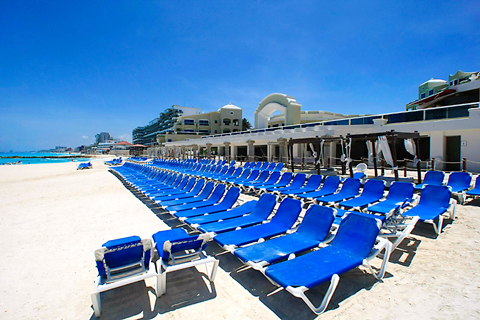Volatility unleashed by the global economic crisis and the swine flu epidemic is hitting the travel industry hard, prompting deep concern among participants at a world tourism conference that opened in Brazil on Friday.
International tourism risks sliding heavily if the H1N1 swine flu spread is upgraded to a pandemic, Said John Walker, an economist at the UK’s Oxford Economics firm.
The number of passengers could drop “up to 60 percent,” he said.

PHOTO: AFP
“The probability of a full blown pandemic is relatively low, but there might be another outbreak in full force of swine flu in the next winter in the northern hemisphere,” Walker said.
The economic crisis, meanwhile, could be more devastating to the sector in the US and Europe than expected, some participants said.
Latin America, host for the first time to the tourism conference organized by the World Travel and Tourism Council (WTTC), seemed to be sheltered from the worst of the crisis, however.
Over the first two months of this year, the number of travelers in the world has decreased 7.7 percent compared with the same period last year, according to the World Tourism Organization. That was worse than the body’s forecast of a 2 percent drop.
“We are unable to see ahead. If we finish the year with a drop of less than 5 percent we can say we held up OK,” said Geoffrey Lipman, the group’s under secretary-general.
Projections were further clouded by the added impact of swine flu, he said.
“Who can say whether one tourist or another has canceled a trip because of fears of the flu, or because he couldn’t pay household expenses,” Lipman asked.
One point is certain: Mexico has borne the brunt of the effects of the H1N1 virus. Near-empty hotels in the tourist beach resort of Cancun have been forced to offer three years of free vacations to any tourist who might become infected by the disease while staying there.
“Right now it looks like a relatively benign epidemic. There was no very violent spread like happened with SARS” in 2003, WTTC head Jean-Claude Baumgarten said.
But he added that he remained cautious in relation to tourism, because anxieties sparked by the flu virus were dampening travel.
The abandonment of Mexico by tourists could prove a boon to Brazil, however. The nation of samba is the second-biggest tourist destination in Latin America with 5.2 million visitors last year.
“Some tourists used to going to Cancun are now going to Salvador de Bahia on Brazil’s Atlantic coast,” said Gisela Mendonga, communications director for Embratur, Brazil’s tourist promotion agency.
Most of Latin America, like Africa, has mostly been spared the drop in tourism seen elsewhere. Overall, the region saw tourist numbers swell by between 3 percent and 5 percent in January and February, the World Tourism Organization said.
Brazilian President Luiz Inacio Lula da Silva, who inaugurated the world tourism conference late on Thursday, urged tourism chiefs to invest in his country, which he said was a haven of “economic stability” while the rest of the globe was suffering.
But so far, actors in the sector are playing wait-and-see. Financial transactions “have almost stalled — everybody is waiting for the crisis to pass,” complained a banker specializing in mergers and acquisitions in the tourism business.

FORCED LABOR: A US court listed three Taiwanese and nine firms based in Taiwan in its indictment, with eight of the companies registered at the same address Nine companies registered in Taiwan, as well as three Taiwanese, on Tuesday were named by the US Department of the Treasury’s Office of Foreign Assets Control (OFAC) as Specially Designated Nationals (SDNs) as a result of a US federal court indictment. The indictment unsealed at the federal court in Brooklyn, New York, said that Chen Zhi (陳志), a dual Cambodian-British national, is being indicted for fraud conspiracy, money laundering and overseeing Prince Holding Group’s forced-labor scam camps in Cambodia. At its peak, the company allegedly made US$30 million per day, court documents showed. The US government has seized Chen’s noncustodial wallet, which contains

SUPPLY CHAIN: Taiwan’s advantages in the drone industry include rapid production capacity that is independent of Chinese-made parts, the economic ministry said The Executive Yuan yesterday approved plans to invest NT$44.2 billion (US$1.44 billion) into domestic production of uncrewed aerial vehicles over the next six years, bringing Taiwan’s output value to more than NT$40 billion by 2030 and making the nation Asia’s democratic hub for the drone supply chain. The proposed budget has NT$33.8 billion in new allocations and NT$10.43 billion in existing funds, the Ministry of Economic Affairs said. Under the new development program, the public sector would purchase nearly 100,000 drones, of which 50,898 would be for civil and government use, while 48,750 would be for national defense, it said. The Ministry of

SENATE RECOMMENDATION: The National Defense Authorization Act encourages the US secretary of defense to invite Taiwan’s navy to participate in the exercises in Hawaii The US Senate on Thursday last week passed the National Defense Authorization Act (NDAA) for Fiscal Year 2026, which strongly encourages the US secretary of defense to invite Taiwan’s naval forces to participate in the Rim of the Pacific (RIMPAC) exercise, as well as allocating military aid of US$1 billion for Taiwan. The bill, which authorizes appropriations for the military activities of the US Department of Defense, military construction and other purposes, passed with 77 votes in support and 20 against. While the NDAA authorizes about US$925 billion of defense spending, the Central News Agency yesterday reported that an aide of US

UNITED: The other candidates congratulated Cheng on her win, saying they hoped the new chair could bring the party to victory in the elections next year and in 2028 Former Chinese Nationalist Party (KMT) lawmaker Cheng Li-wun (鄭麗文) yesterday won the party’s chair election with 65,122 votes, or 50.15 percent of the votes. It was the first time Cheng, 55, ran for the top KMT post, and she is the second woman to hold the post of chair, following Hung Hsiu-chu (洪秀柱), who served from 2016 to 2017. Cheng is to succeed incumbent Eric Chu (朱立倫) on Nov. 1 for a four-year term. Cheng said she has spoken with the other five candidates and pledged to maintain party unity, adding that the party would aim to win the elections next year and